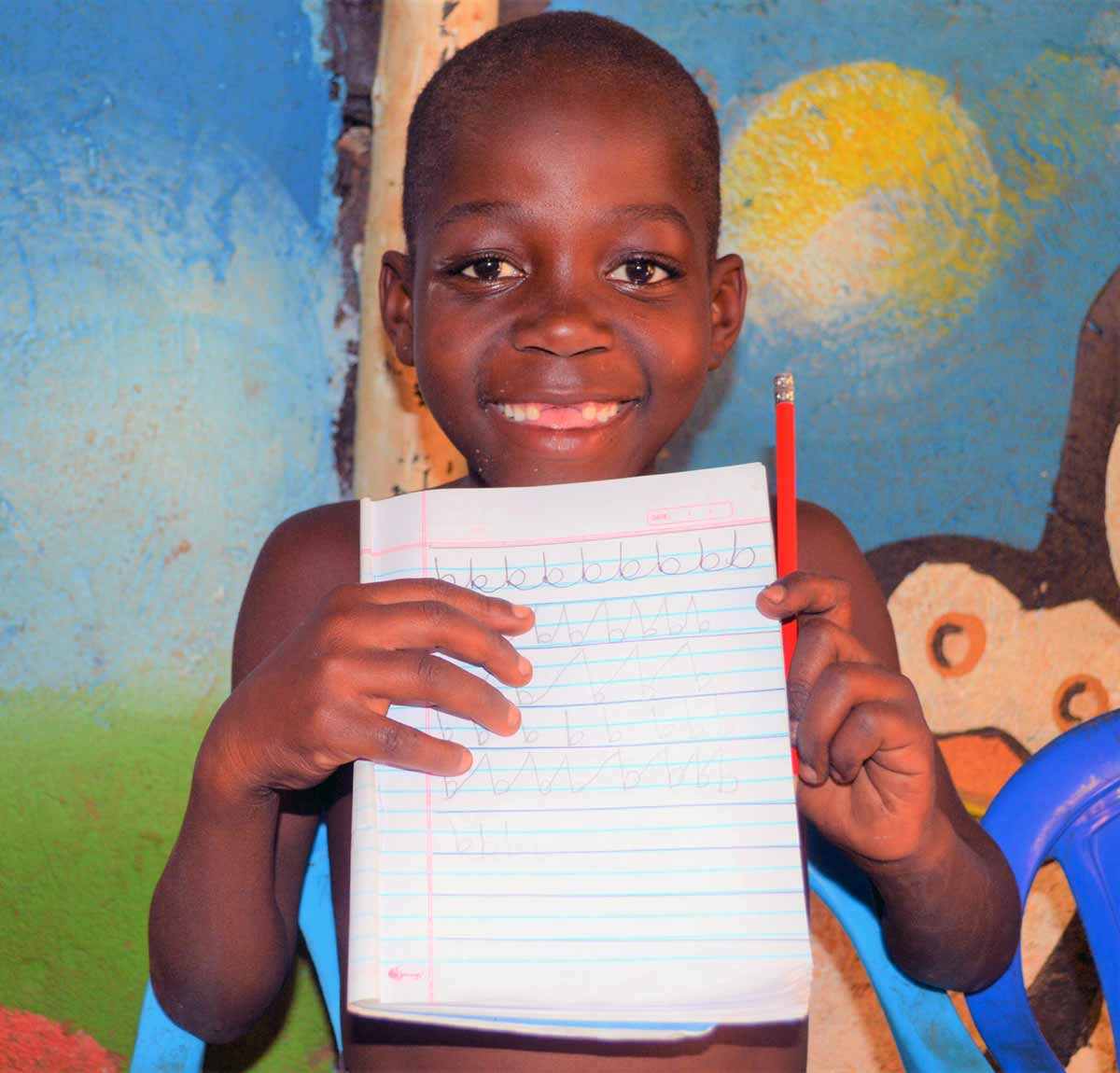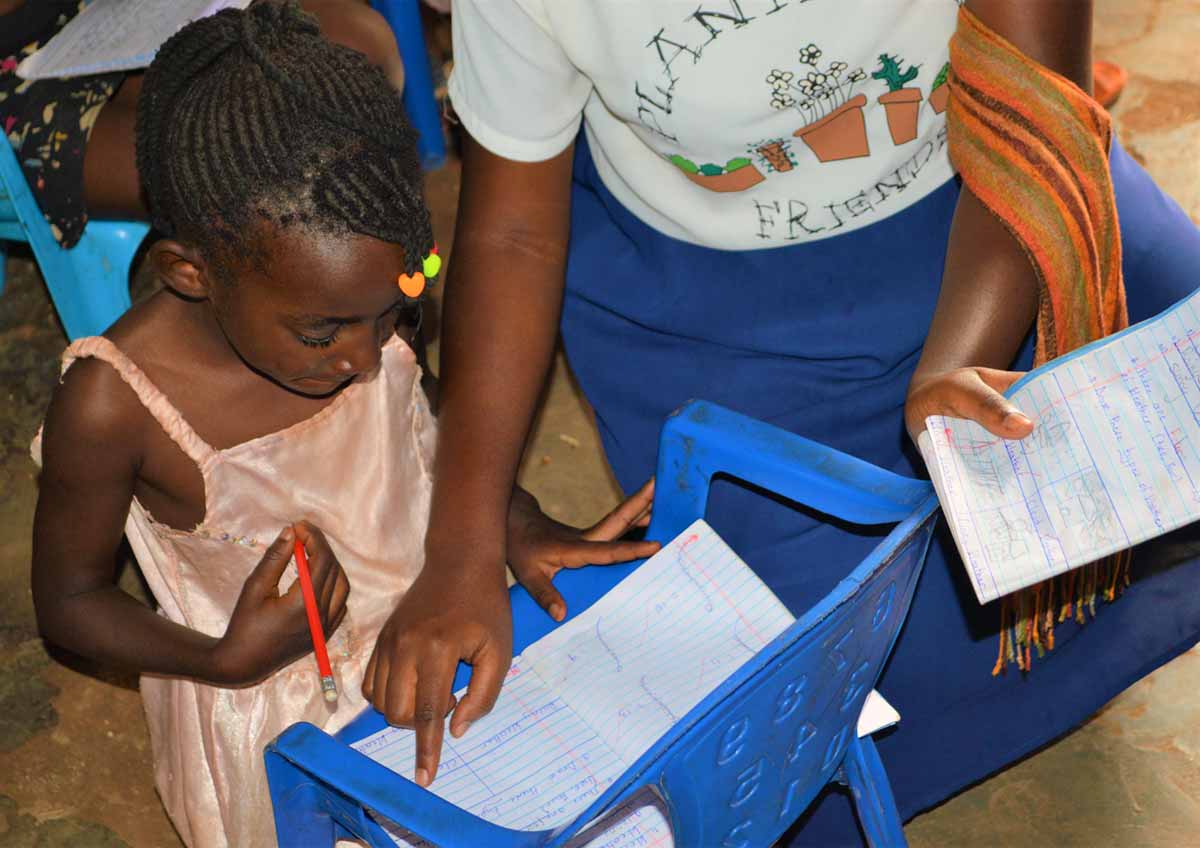Kids Club Kampala began over 10 years ago, organising kids clubs for children living in informal settlements in this Ugandan city. Today we run a range of projects to meet basic needs and bring about sustainable change for the communities in several informal settlements in Kampala. Access to education is one of our key focus areas as we believe it is critical in breaking the perpetuating cycle of poverty, which many of the families we support experience.

Background
Many children living in Kampala’s informal settlements do not attend school at all. Primary school enrolment rates are declining each year and there is a high dropout rate for those who do register (64.5%).1
In our experience, out-of-school children are often left unsupervised during the day. Without a daily purpose or safe space to go, they are at risk from health and safety hazards. In some instances, children are required to work as a way of providing extra income for the family. Education, therefore, can be seen as not economically viable when basic needs are seldom met.
Kids Club Kampala is a community-led organisation that aims to empower local people to be active in their own development and to make a difference in their own communities. We believe in asking people what their needs are and how we can best help them, and giving people the space to come up with creative solutions themselves. We work closely with local authorities, community leaders, and beneficiaries to ensure that our programmes are appropriate and meet needs in the best way.
The Early Education for All project
Established in 2011, our Early Education for All project provides basic tuition to out-of-school children in three of Kampala’s biggest and poorest informal settlements: Katanga, Naguru and Namuwongo. It gives vulnerable children aged 3 to 6 years old an opportunity to learn, interact and thrive and is flexible to the needs of the children who attend. The education classes are taught by Ugandan qualified teachers and are non-formal. They take place in the afternoon as girls are required to help their mothers with chores in the mornings according to local traditions and societal norms. The classes run from Monday to Friday every week throughout the year.
Children participate in structured play, singing, drawing, moulding, painting and other activities that aid their learning and the development of:
- numeracy skills;
- literacy skills;
- social skills;
- physical education.
The lessons are designed to follow the Ugandan ECDE curriculum. The flexibility of a non-formal approach allows teachers to tailor learning to the different ages and educational needs to each child and fosters inclusivity. However, the programme encourages a positive classroom environment and provides children with clear routines and goals.
Hannah, aged 7, in her own words, describes the benefit of the Early Education project for her:
“I attend Kids Club Kampala’s Education project every day in my community. I really like going because it has boosted up my brain. I have always hoped to go to school and now I am learning a lot. My teachers have helped me with learning how to read and write and many other things. Thank you Kids Club Kampala for supporting children like me who do not go to school.”
Free to all
The programme is free for all children attending. They are not asked to provide any materials for learning, which means that these classes are completely free and thus accessible to the poorest and most vulnerable children. This project also provides a safe place for children to go each day with responsible adults to supervise them, thus protecting them from harm when their parents are at work. Children from the poorest families who would have no other way of accessing early education are specifically targeted to enrol in the project, identified through a needs assessment.
Engaging parents
In addition to our work with the children, we aim to develop close partnerships with parents to help cater to their children’s needs. We hold regular parents meetings to foster parental engagement with the project. They are updated on their child’s progress and invited to provide feedback as to how they think the project could be improved. Parents are also provided with training around children’s rights and the benefits of their children gaining an education.
Supporting basic needs
Our project fosters inclusivity, welcoming all children aged 3 to 6 years old. The centres are located in the heart of informal settlement communities so that they are easily accessible and remove transport as a barrier to learning. Additionally, parents are incentivised to send their child to the education centres each day as we provide each child with a hot, nutritious meal to help meet basic needs, tackle malnutrition, and provide the children with a better start towards a prosperous future. School feeding programmes also improve children’s concentration levels, which enables them to learn new skills and grow.

Disability inclusive
This project caters to the needs of children with disabilities. The community classrooms are fully accessible and the teachers and teaching assistants receive relevant and frequent training on practical day-to-day ways they can help and support children with disabilities and special needs. This training is provided by partner organisations in Kampala, such as the Uganda Society for Disabled Children (USDC). Our teachers also work closely with social workers to identify at-risk children and get them the support they need to assist their early childhood development.
COVID-19
More recently, during the COVID-19 crisis, our teachers provided workbooks and stationery and support for parents so that children could continue to access the project and learn from home. The crisis provided an unexpected opportunity for us to expand our reach to more out-of-school children and, as such, we are hoping to expand this approach further in the future.
The impact of the COVID-19 crisis on informal settlement communities has been far reaching and has forced families further into chronic poverty. We anticipate that even more children will drop out of school due to poverty and thus the need for this project will dramatically increase. As Uganda begins to transition out of lockdown and our classes return to normal, we anticipate there will be increasing poverty levels in the informal settlements, and children currently in formal education may drop out due to their families falling into poverty. There will be an increased need for this project.
Contact: Olivia is the CEO of Kids Club Kampala. Email: olivia@kidsclubkampala.org
[1] http://bit.ly/eer9-17
